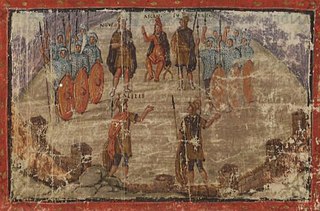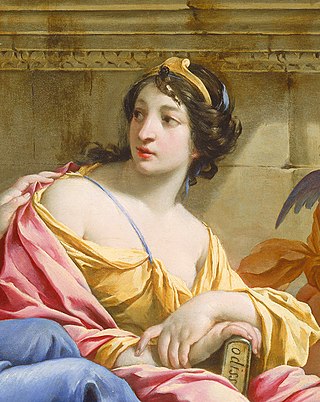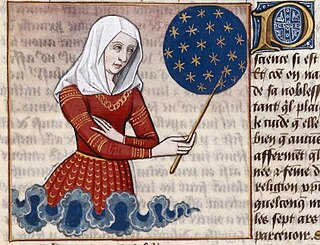
Publius Vergilius Maro, usually called Virgil or Vergil in English, was an ancient Roman poet of the Augustan period. He composed three of the most famous poems in Latin literature: the Eclogues, the Georgics, and the epic Aeneid. A number of minor poems, collected in the Appendix Vergiliana, were attributed to him in ancient times, but modern scholars consider his authorship of these poems as dubious.
In Greek and Roman mythology, Achates may refer to the following personages:

The Vergilius Vaticanus, also known as Vatican Virgil, is a Late Antique illuminated manuscript containing fragments of Virgil's Aeneid and Georgics. It was made in Rome in around 400 CE, and is one of the oldest surviving sources for the text of the Aeneid. It is the oldest and one of only three ancient illustrated manuscripts of classical literature.

The Vergilius Romanus, also known as the Roman Vergil, is a 5th-century illustrated manuscript of the works of Virgil. It contains the Aeneid, the Georgics, and some of the Eclogues. It is one of the oldest and most important Vergilian manuscripts. It is 332 by 323 mm with 309 vellum folios. It was written in rustic capitals with 18 lines per page.

In Greek mythology, Calliope is the Muse who presides over eloquence and epic poetry; so called from the ecstatic harmony of her voice. Hesiod and Ovid called her the "Chief of all Muses".

The Appendix Vergiliana is a collection of poems traditionally ascribed as being the juvenilia of Virgil.

Virgil, also spelled Vergil, Vergilius, Virgilius, Feirgil or Fearghal, was an Irish churchman and early astronomer. He left Ireland around 745, intending to visit the Holy Land; but, like many of his countrymen, he settled in Francia. Virgil served as abbot of Aghaboe, bishop of Ossory and later bishop of Salzburg. He was called "the Apostle of Carinthia" and "the geometer".

SAGE Publishing, formerly SAGE Publications, is an American independent publishing company founded in 1965 in New York by Sara Miller McCune and now based in Newbury Park, California.

In Book V of Ovid's mock-epic Metamorphoses, Athis is a young demigod of outstanding beauty from India, son of Limnaee, a nymph of the Ganges.

Faltonia Betitia Proba was a Latin Roman Christian poet, perhaps the earliest female Christian poet whose work survives. A member of one of the most influential aristocratic families, she composed the Cento Vergilianus de laudibus Christi, a cento composed with verses by Virgil re-ordered to form an epic poem centred on the life of Jesus.
James Enge is the pseudonym of James M. Pfundstein, an American fantasy and sword and sorcery author. His best known work is the ongoing Morlock the Maker series. His first novel in the series, Blood of Ambrose, was nominated for the World Fantasy Award in 2010. His newest series, A Tournament of Shadows, tells the origin story of his famous character Morlock Ambrosius.
In Greek mythology, Thalia or Thaleia was one of the fifty Nereids, marine-nymph daughters of the 'Old Man of the Sea' Nereus and the Oceanid Doris. Her name was derived from θάλλειν thállein which means "to flourish, to be green".
Otto Skutsch was a German-born British classicist and academic, specialising in classical philosophy. He was Professor of Latin at University College London from 1951 to 1972.

Elizabeth Ann Clark was a professor of the John Carlisle Kilgo professorship of religion at Duke University. She was notable for her work in the field of Patristics, and the teaching of ancient Christianity in US higher education. Clark expanded the study of early Christianity and was a strong advocate for women, pioneering the application of modern theories such as feminist theory, social network theory, and literary criticism to ancient sources.
Eleanor Winsor Leach was the Ruth N. Halls Professor with the Department of Classical Studies at Indiana University. She was a trustee of the Vergilian Society in 1978-83 and was second and then first vice-president in 1989-92. Leach was the president of the Society of Classical Studies in 2005/6, and the chair of her department (1978-1985). She was very involved with academics and younger scholars - directing 26 dissertations, wrote letters for 200 tenure and promotion cases, and refereed more than 100 books and 200 articles. Leach's research interests included Roman painting, Roman sculpture, and Cicero and Pliny's Letters. She published three books and more than 50 articles. Leach's work had an interdisciplinary focus, reading Latin texts against their social, political, and cultural context. From the 1980s onwards, she combined her work on ancient literature with the study of Roman painting, monuments, and topography.

Steven L. Tuck is a professor of classics, who is currently head of classics at Miami University. He teaches many classics courses at Miami University, especially those relating to the arts. He received a Ph.D. in Classical Art and Archaeology from University of Michigan in 1997, and he is the author of the textbook A History of Roman Art.

Grace Starry West was an American classics scholar, best known as co-translator of a popular English edition of four texts on Socrates. She taught at the University of Dallas in Texas, and at Hillsdale College in Michigan.
In Greek mythology, Spio was one of the 50 Nereids, marine-nymph daughters of the 'Old Man of the Sea' Nereus and the Oceanid Doris. Variations of her name were Speio and Speo.
In Greek mythology, Alcander or Alcandrus (Ancient Greek: Ἄλκανδρος may refer to the following characters:

Corynaeus is the name of one or more characters in Virgil's Aeneid (29–19 BCE). The first mention of Corynaeus in the poem is as a Trojan follower of Aeneas, who performs funerary rites for Misenus. Characters of the same name are then specified both as being killed by an archer, and later fighting in the final battle. This apparent contradiction is often explained by defining these as two separate characters.












